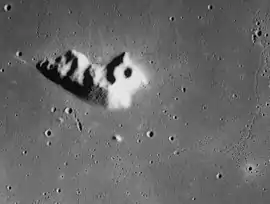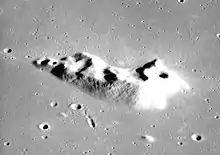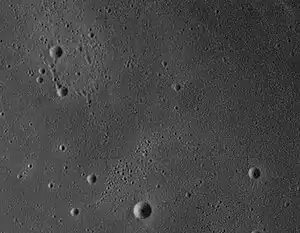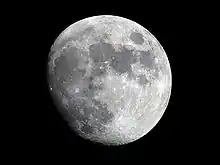Mons La Hire
Mons La Hire is a solitary lunar mountain in the western Mare Imbrium. It is located to the northeast of the crater Euler, and to the west-northwest of Lambert.
| Mons La Hire | |
|---|---|
 | |
| Highest point | |
| Elevation | 1.5 km |
| Listing | Lunar mountains |
| Coordinates | 27.66°N 25.51°W |
| Naming | |
| Etymology | Philippe de La Hire |
| Geography | |
| Location | the Moon |

The selenographic coordinates of this feature are 27.8° N, 25.5° W, and it has a maximum diameter at the base of 25 km. The mountain base has a shape roughly like an arrow head, with the point oriented toward the west-northwest. The peak has a height of 1.5 km above the surface.
This feature was named after Philippe de La Hire, a French mathematician and astronomer.[1]
Nearby craters

Several tiny craters near this mountain have been assigned names by the IAU. These are listed in the table below. Felix and Verne are located to the south of the peak, while the remainder are grouped to the north and northeast.
| Crater | Coordinates | Diameter | Name source |
|---|---|---|---|
| Annegrit | 29.4°N 25.6°W | 1 km | German feminine name |
| Charles | 29.9°N 26.4°W | 1 km | French masculine name |
| Felix | 25.1°N 25.4°W | 1 km | Latin masculine name |
| Mavis | 29.8°N 26.4°W | 1 km | Scottish feminine name |
| Verne | 24.9°N 25.3°W | 2 km | Latin masculine name |
Satellite craters
By convention these features are identified on lunar maps by placing the letter on the side of the crater midpoint that is closest to Mons La Hire.
| La Hire | Coordinates | Diameter, km |
|---|---|---|
| A | 28.53°N 23.46°W | 5 |
| B | 27.69°N 23.03°W | 4 |
La Hire A is on the northeast side of Dorsum Zirkel, and La Hire B is on the southwest side.
The following craters have been renamed by the IAU.
- La Hire D — See Caventou (crater).
References
- "Mons La Hire". Gazetteer of Planetary Nomenclature. USGS Astrogeology Research Program.
- Andersson, L. E.; Whitaker, E. A. (1982). NASA Catalogue of Lunar Nomenclature (PDF). NASA RP-1097. Archived from the original on 2014-10-06.CS1 maint: bot: original URL status unknown (link)
- Bussey, B.; Spudis, P. (2004). The Clementine Atlas of the Moon. New York: Cambridge University Press. ISBN 978-0-521-81528-4.
- Cocks, Elijah E.; Cocks, Josiah C. (1995). Who's Who on the Moon: A Biographical Dictionary of Lunar Nomenclature. Tudor Publishers. ISBN 978-0-936389-27-1.
- McDowell, Jonathan (July 15, 2007). "Lunar Nomenclature". Jonathan's Space Report. Retrieved 2007-10-24.
- Menzel, D. H.; Minnaert, M.; Levin, B.; Dollfus, A.; Bell, B. (1971). "Report on Lunar Nomenclature by the Working Group of Commission 17 of the IAU". Space Science Reviews. 12 (2): 136–186. Bibcode:1971SSRv...12..136M. doi:10.1007/BF00171763.
- Moore, Patrick (2001). On the Moon. Sterling Publishing Co. ISBN 978-0-304-35469-6.
- Price, Fred W. (1988). The Moon Observer's Handbook. Cambridge University Press. ISBN 978-0-521-33500-3.
- Rükl, Antonín (1990). Atlas of the Moon. Kalmbach Books. ISBN 978-0-913135-17-4.
- Webb, Rev. T. W. (1962). Celestial Objects for Common Telescopes (6th revision ed.). Dover. ISBN 978-0-486-20917-3.
- Whitaker, Ewen A. (2003). Mapping and Naming the Moon. Cambridge University Press. ISBN 978-0-521-54414-6.
- Wlasuk, Peter T. (2000). Observing the Moon. Springer Science & Business Media. p. 61. ISBN 978-1-852-33193-1.
External links
| Wikimedia Commons has media related to Mons La Hire. |
- "LTO-40A4 La Hire". L&PI topographic map. Retrieved 4 November 2005.
